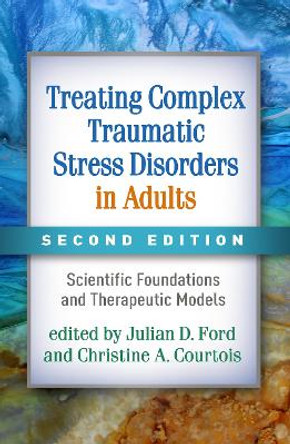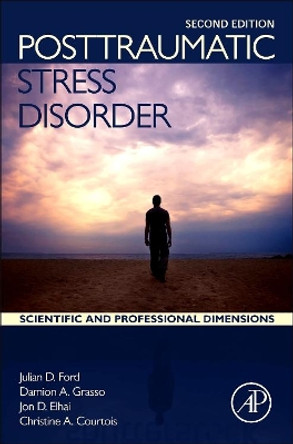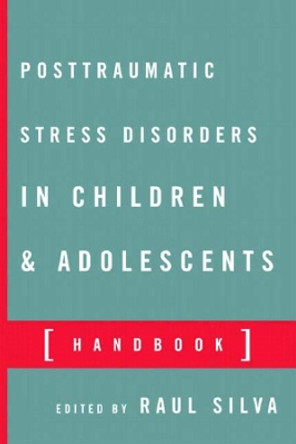Description
With contributions from prominent experts, this pragmatic book takes a close look at the nature of complex psychological trauma in children and adolescents and the clinical challenges it presents. Each chapter shows how a complex trauma perspective can provide an invaluable unifying framework for case conceptualization, assessment, and intervention amidst the chaos and turmoil of these young patients' lives. A range of evidence-based and promising therapies are reviewed and illustrated with vivid case vignettes. The volume is grounded in clinical innovations and cutting-edge research on child and adolescent brain development, attachment, and emotion regulation, and discusses diagnostic criteria, including those from DSM-IV and DSM-5.
See also Drs. Ford and Courtois's edited volume Treating Complex Traumatic Stress Disorders in Adults, Second Edition, and their authored volume, Treatment of Complex Trauma: A Sequenced, Relationship-Based Approach.
About the Author
Julian D. Ford, PhD, ABPP, a clinical psychologist, is Professor of Psychiatry at the University of Connecticut School of Medicine, where he is Director of the Center for Trauma Recovery and Juvenile Justice and the Center for the Treatment of Developmental Trauma Disorders. He has served as President of the International Society for Traumatic Stress Studies, is a Fellow of the American Psychological Association, and is Associate Editor of the Journal of Trauma and Dissociation and European Journal of Psychotraumatology. Dr. Ford has published more than 250 articles and book chapters. He is coeditor of Treating Complex Traumatic Stress Disorders in Adults, Second Edition, and Treating Complex Traumatic Stress Disorders in Children and Adolescents, and coauthor of Treatment of Complex Trauma: A Sequenced, Relationship-Based Approach. His research focuses on developmental trauma disorder and the Trauma Affect Regulation: Guide for Education and Therapy (TARGET) therapeutic intervention.
Christine A. Courtois, PhD, ABPP, a board-certified counseling psychologist, is retired from private practice in Washington, DC, and is a consultant/trainer on topics on trauma psychology and treatment. She cofounded and then served for 16 years as Clinical and Training Director of The CENTER: Posttraumatic Disorders Program, in Washington, DC. Dr. Courtois was chair of the Clinical Practice Guideline for the Treatment of Posttraumatic Stress Disorder in Adults for the American Psychological Association (APA), released in 2017, and for guidelines on the treatment of complex trauma for several professional organizations. She has published a number of books (four of them coedited or coauthored with Julian Ford) and numerous book chapters and articles on trauma-related topics. Dr. Courtois is past president of APA Division 56 (Trauma Psychology) and past founding Associate Editor of the Division's journal, Psychological Trauma: Theory, Research, Practice, and Policy. She served two terms on the Board of Directors of the International Society for Traumatic Stress Studies (ISTSS). She has received the Award for Distinguished Contributions to Independent Practice from the APA, the Sarah Haley Award for Clinical Excellence from ISTSS, and, most recently, the Award for Distinguished Service and Contributions to the Profession of Psychology from the American Board of Professional Psychology.
Reviews
"Describing evidence-based models for treatment of complex trauma in children, this book is interwoven with contemporary knowledge about psychobiology and is richly illustrated with extended clinical examples. In addition to a focus on individual treatment, some chapters address the systems within which traumatized children live and are treated. There is a repeated focus throughout the chapters on attachment, self-regulation, and engaging families in treatment. The book provides an excellent foundation for clinicians working with this population."--Laurie Anne Pearlman, PhD, past president, Trauma Research, Education, and Training Institute, Inc.
"This volume comprehensively examines complex trauma in children and adolescents, from its neurobiological impact to the development and dissemination of evidence-based treatments. Newer therapies currently being tested are also discussed; case examples illustrate the use of each modality. Clinical challenges related to self-regulation, dissociation, impaired caregiver attachment, and intergenerational trauma are addressed. Written with clarity and detail, each chapter will benefit both trainees and seasoned mental health and medical practitioners. This book fosters needed synergy between scientific inquiry and real-world clinical applications in this important field."--Alesia O. Hawkins, PhD, Department of Family and Community Medicine, University of Illinois College of Medicine at Rockford
"I have used this book in both advanced undergraduate- and graduate-level courses. It provides an excellent overview of the neurobiological consequences of early and ongoing trauma, as well as best practices for assessment and intervention to help children and families. The blend of chapters on the consequences of trauma for early development with those on evidence-based treatments and practices specific to complex trauma is very helpful to students in training to enter a variety of clinical and behavioral health fields. This book has been an excellent companion reader in my trauma-focused intervention course."--Carla Smith Stover, PhD, Department of Mental Health Law and Policy, University of South Florida
"It's all here, including insights into neuroscience, family dynamics, assessment, and--most centrally--intervention. Clinicians and advanced students of psychiatry, psychology, and social work will consider this book a tremendous resource. Chapters on betrayal trauma, multitraumatized children, and treatment approaches are particularly useful for psychotherapists. The list of authors reads as a 'who's who' in the field. If you've ever wondered what to do to help a severely traumatized child, this book is for you."--Lisa Aronson Fontes, PhD, University Without Walls, University of Massachusetts Amherst
-The editors have organized a large panel of experts in the field of complex trauma who provide the many excellent chapters found in this unique and groundbreaking text. This text is unique in that it brings together various specialties dealing with complex PTSD, many of which may be unfamiliar to those trained purely within a cognitive behavioral model....This is an important book edited by individuals with significant accomplishment and familiarity with this very challenging field. The various chapter authors have done a commendable job in detailing their particular points of view and providing enlightening examples to emphasize and explain their way of thinking. The book is very well referenced and any reader interested in any of the various strategies presented will find it easy to further their interest and education by exploring the writings of the experts in any of these fields. This would make an excellent graduate-level text in psychiatry, psychology, or social work and should be seriously considered by any program offering child and adolescent psychotherapy. It should be especially considered in programs dealing with trauma and stress disorders.--Child and Family Behavior Therapy, 1/2/2014ffThe text goes beyond specific trauma models, providing a unifying conceptualization of complex traumatic stress disorders, their development and presenting features, before directing the reader to specific clinical recommendations...I would thoroughly recommend this book.--Journal of Behavioural and Cognitive Psychotherapy, 7/1/2014
Book Information
ISBN 9781462524617
Author Julian D. Ford
Format Paperback
Page Count 368
Imprint Guilford Press
Publisher Guilford Publications
Weight(grams) 560g






